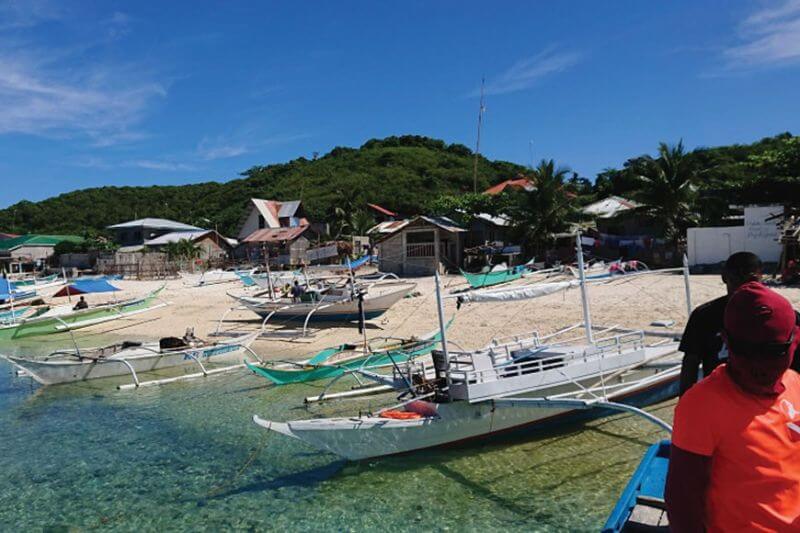ON March 19, 2021, there was a profusion of thanks from teachers at Carnaza Elementary School to people they didn’t know personally.
Because of these people, Carnaza Island–a fishing village that basks under the sun–now has 24 hours of solar power.
With power comes access to mobile communication, internet, better learning aids, television. Project Renewable Energy for Livelihood and Youth (Rely) is making a difference in the lives of the Carnaza folk, who subsist on fishing. Project Rely has completed installing a solar power system at the Carnaza Elementary School (CES) and Carnaza National High School (CNHS).
Carnaza, barely seen in the map of Cebu, is an hour away by pumpboat from Malapascua Island in Daanbantayan town.
Impact on Learning
Speaking for Carnaza teachers, CES school head Ma. Remedios Beloria said at the March 19 turnover ceremony, “The long wait is over. This is it!”
She said that with power available, the teaching process has improved a lot. “We can now use the projector. We can now reproduce our teaching material faster and easier. We no longer have to go to the mainland to do this. We can reproduce it here in Carnaza.”
“We can make learning more enjoyable for the children,” Beloria said.
In off-grid islands like Carnaza, the absence of electricity had hampered students from learning using the computer.
The impact of an energized school will be felt by the students once physical classes are held again. For now, because of the Covid pandemic that shut down classrooms, CES and CNHS are into modular lessons.
Accomplishment
“We look forward to the time when the students are able to come to school physically and experience how their learning conditions have improved. For now, the fully energized schools are helping teachers prepare the modules that their students need,” said Rely project director Sabine Schacknat, from lead implementor sequa gGmbH.
Through a video recorded in Germany, Schacknat thanked the community for helping the project team accomplish the solar installation amid the quarantine restrictions.
Rely is promoting the use of renewable energy to improve lives and foster climate change mitigation in poor and remote communities in Cebu, Bohol and Palawan.
The approach combines solar electrification with community development and improved vocational education by collaborating with five partner senior high schools located closest to the off-grid schools.
Partner school
For Carnaza, the partner school is Daanbantayan National High School (DNHS), which received from Project Rely a set of tools and equipment to upgrade technical-vocational track for its Electrical Installation and Maintenance (EIM).
Since the donation was turned over in June 2019, DNHS-EIM students have acquired knowledge and skills on solar technology. The ceremonial turnover was held belatedly, on March 18, 2021, because of the quarantine restrictions.
Project Rely’s implementing partners are Vivant Foundation and Process Bohol.
Sustainability
Vivant Foundation Inc. executive director Shem Jose W. Garcia said the partnership with the senior high school is needed “to ensure the sustainability of the solar energization component.”
“EIM students who are now getting instruction on solar technology will the be one conducting the maintenance of the solar installation at the grid school,” Garcia said.
He said the solar power system needs to be maintained but the island folk don’t have the skills to do that. Installing solar panels doesn’t require a college degree, that’s why senior high students are tapped to learn EIM.
The hardware and the know-how are integrated, Garcia said.
“It’s not just good for the environment, it’s not just a way of lessing our carbon footprint, but it’s also a way of opening doors to the future of work for our students here (in DNHS),” Garcia said.
Four of the DNHS-EIM graduates have been hired by the solar company that installed the solar in Carnaza, he said. “We hope to see EIM become a regular part of the curriculum.”
Relevant, Liberating
Department of Education (DepEd) Assistant Regional Director Cristito Eco said it is important that the education department’s offering be “relevant and liberating.”
“When we offer the right course for our learners to respond to a demand, then eventually they will be employed and they will be liberated from poverty,” Eco said at the turnover ceremonies in Daanbantayan and Carnaza.
“When you are an EIM graduate, there are a lot of opportunities, more so if you are certified by Tesda,” Eco said.
Cebu Schools Division Superintendent Marilyn Andales said she saw “the acceptance and eargerness of our students to learn the different competencies of the course.”
Meanwhile, Process-Bohol has been organizing the communities of the 16 off-grid schools to help them identify and implement livelihood activities.
“Livelihood development and the support for micro, small and medium enterprises in the off-grid communities are vital to the sustainability of any development project and are necessary for the endeavor to achieve collective impact,” said Process-Bohol executive director Aurelio Salgados Jr.
Project Rely is one of the seven awardees under the EU-Access to Sustainable Energy Programme (Asep). It received a P120-million funding from the EU, as well as additional financing from the Federal Government of Germany.
Asep is a joint project of the Department of Energy and the European Union that aims to assist the Government of the Philippines in expanding its sustainable energy generation to meet the growing needs of its economy and provide energy access to the poor and marginalized sector. (MPS)
Read the original story here.
(Published in SunStar Cebu April 06, 2021)

